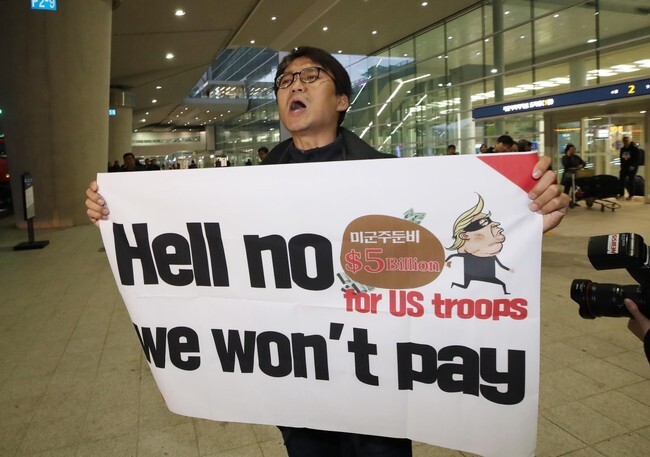Posted on : Nov.18,2019 16:29 KST
Modified on : Nov.18,2019 16:38 KST
 |
|
A protester denounces the US’ demands for increasing South Korea’s financial contribution to stationing US troops in Korea upon the arrival of James DeHart, the chief US negotiator in defense cost-sharing talks with South Korea, at Incheon International Airport on Nov. 17. (Yonhap News)
|
Washington insiders worry Trump’s efforts “squeeze cash from allies” will degrade alliances
 |
|
A protester denounces the US’ demands for increasing South Korea’s financial contribution to stationing US troops in Korea upon the arrival of James DeHart, the chief US negotiator in defense cost-sharing talks with South Korea, at Incheon International Airport on Nov. 17. (Yonhap News)
|
The US, which is pressuring South Korea to pay a larger share of defense costs, also demanded that Japan increase its defense cost share by four to five times its current level, a report alleged. Within the US, the Donald Trump administration is facing increasing criticism for its “excessive” attempts to squeeze cash from allies.
The demand was communicated to Japan last July during a visit by then White House National Security Advisor and National Security Council Senior Director for East Asia Matthew Pottinger, the foreign affairs journal Foreign Policy said in a Nov. 15 report citing accounts from current and former officials. Around 54,000 US troops are currently stationed in Japan, which is paying a share of around US$2 billion this year according to a US-Japan defense cost sharing agreement that ends in March of next year. According to former defense officials, Washington demanded an amount of US$8 billion, representing a 300% increase.
Some reports have suggested the increase demanded by the US is even larger. Japan’s Kyodo News quoted government officials the same day as saying the US demanded a defense cost share of five times its current level -- which, if finalized, would have Japan paying 980 billion yen (around US$9.02 billion) per year. The Trump administration has also demanded an increased defense cost share from the North Atlantic Treaty Organization (NATO), which together with Canada will have paid over US$100 billion more between 2016 and the end of next year, Foreign Policy reported.
Already, Washington has been mobilizing senior officials to openly push for a larger share of defense costs amid the current discussions with Seoul on the 11th Special Measures Agreement (SMA). The US is reportedly demanding that South Korea pay a share five times larger than its 2019 level.
Expert says excessive demands “could trigger anti-Americanism”
Some are warning that the excessive demands for larger shares could harm the US’ ties with its allies. Bruce Klingner, a senior research fellow with the conservative think tank Heritage Foundation, told Foreign Policy that “this kind of demand, not only the exorbitant number, but the way it is being done, could trigger anti-Americanism.”
“If you weaken alliances, and potentially decrease deterrence and US troop presence, that benefits North Korea, China, and Russia,” he warned.
At a Nov. 15 seminar in Washington organized by the Asia Society, David Maxwell, a senior research fellow at the US think tank Foundation for the Defense of Democracies, noted that the defense cost-sharing issue “affects the foundation of the entire US alliance structure.”
“Will US alliances be based on shared interests, values, and strategy, or are they evolving to become purely transactional relationships resting solely on the amount of funding for US forces?” he asked.
Democratic Rep. Grace Meng called for reconsideration in a letter the same day to Secretary of State Mike Pompeo and Secretary of Defense Mark Esper.
“To request a 500% increase within one year from Seoul shows no regard for the mutual benefit of this critical alliance, and puts US national security and economic interests in the region in jeopardy,” she wrote.
Meanwhile, a third meeting for the conclusion of the 11th SMA to take effect next year is taking place in Seoul on Nov. 18-19. The major differences in perspective between the South Korean and US sides suggest the tense tug-of-war will continue.
By Hwang Joon-bum, Washington correspondent, Cho Ki-weon, Tokyo correspondent, and Noh Ji-won, staff reporter
Please direct comments or questions to [english@hani.co.kr]








